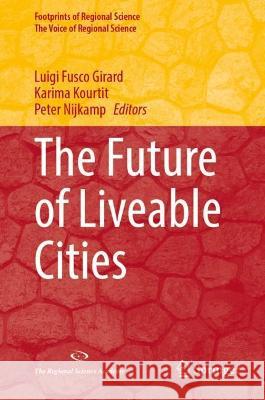The Future of Liveable Cities » książka



The Future of Liveable Cities
ISBN-13: 9783031374654 / Angielski
The Future of Liveable Cities
ISBN-13: 9783031374654 / Angielski
(netto: 766,76 VAT: 5%)
Najniższa cena z 30 dni: 655,41
ok. 16-18 dni roboczych.
Darmowa dostawa!
Luigi Fusco Girard is an emeritus professor at University Federico II of Naples, Italy. He is associate at National Council of Research (CNR- IRISS) and the Scientific Coordinator of the Horizon 2020 CLIC project (www.clicproject.eu) on innovative business, financing and governance models for the adaptive reuse of cultural heritage in the perspective of the circular economy and circular city model. As ISCEC-ICOMOS President, he has participated at the Stakeholders’ Committee meetings for the European Year of Cultural Heritage 2018, contributing with inspirational and scientific papers on the role of cultural heritage as “connective” infrastructure of European cities and regions. He is the Director of International Laboratory on Creative and Sustainable City that has been recognized by UN-Habitat (from 2011) and UN-Habitat Universities (from 2015) as coordinator of Universities Research Hub on Urban Regeneration.
Peter Nijkamp is an emeritus professor of regional and urban economics and of economic geography at the VU University, and is also associated with The Open University of the Netherlands (OU), Heerlen (The Netherlands); Alexandru Ioan Cuza University of Iasi, Iasi (Romania); KTH Royal Institute of Technology, Stockholm (Sweden), the University of Technology, Benguérir (Morocco) and A. Mickiewicz University, Poznan (Poland). He serves on the editorial/advisory boards of more than 30 journals. According to the RePec list, he is one of the top 30 best-known economists in the world. He is also a fellow and former vice-president of the Royal Netherlands Academy of Sciences. He has served as president of the governing board of the Netherlands Research Council (NWO). In 1996, he was awarded the most prestigious scientific prize in the Netherlands, the Spinoza award. He is co-editor of the Handbook of Regional Science published by Springer.
This book explores the concept of livable cities, where people enjoy living and being, and examines indicators of citizens' well-being in relation to the urban environment. It is authored by experts from diverse disciplines, providing a citizen-centered perspective on urban well-being in sustainable, environmentally friendly, and climate-neutral (or -positive) cities. The contributions focus on the human and social aspects of cities, developing operational models and frameworks for circular cities, smart resource utilization, and examining contextual factors such as environmental and neighborhood quality, energy transition, climate neutrality, and recycling as factors that influence the well-being of "homo urbanus.” The chapters approach these topics from various analytical perspectives, including conceptual/theoretical, methodological/modeling, policy/planning, and evidence-based case studies. This book will be of interest to scholars in regional and spatial science, urban geography, economics, and related fields, as well as those interested in urban well-being.
1997-2026 DolnySlask.com Agencja Internetowa
KrainaKsiazek.PL - Księgarnia Internetowa









